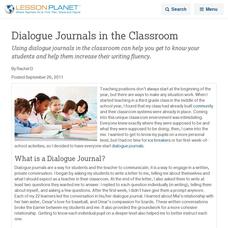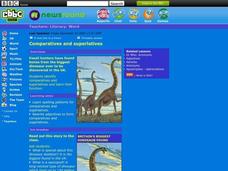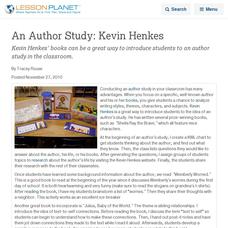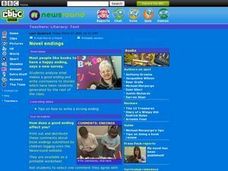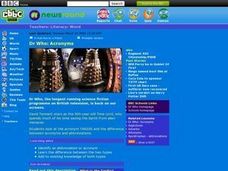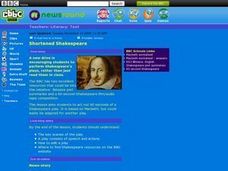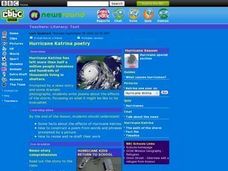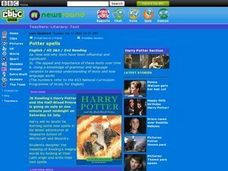Curated OER
Meet Your Neighbor: Action Verbs
Get your kids moving on the first day of school! This action verb activity doesn't have to be used as an ice breaker, but it sure will work as one. Simply place pairs of cards face-side down on the carpet, each with an action verb...
Curated OER
Hey Teachers! Get to Know Me!
Foster community in your classroom and encourage learners to get up and get to know each other. Individuals each receive the classmate inventory handout included and use it to fill in information about their fellow scholars. Once they...
Curated OER
Getting to Know You
After going over the five steps of the writing process, pupils fill out "Getting to Know You" worksheets. They trade papers with each other, and have the task of writing a descriptive paragraph about the person whose worksheet they...
Curated OER
What's in a Name?
Young scholars read an imagined profile about themselves written by a new teacher. They find definitions for words they do not explain and then explain to partners what is or isn't correct about their profiles.
Curated OER
Getting to Know You
Need a first day ice breaker? Try this getting to know you exercise. Pupils stand in a circle and introduce themselves. The trick is they add an adjective that describes them and starts with the same letter as their first name. Add a...
Curated OER
We Are Different; We Are Alike........
First graders explain that everybody is unique in their own way by participating in this lively, art and language based series of lesson plans. They would greatly benefit from engaging in these plans in the beginning of the year as an...
Curated OER
Finding Problems In A Story
Students categorize information into a problem/solving chart and examine the value of using a diary. In this problem solving and diary lesson, students read portions of Dear Mr. Henshaw, while they investigate the importance of keeping a...
Curated OER
Make reading cool
Learners look at ways of encouraging others to read and write a letter to Jacqueline Wilson. Students read a a news article on Jackqueline Wilson. They discuss ways or promoting reading. Learners imagine they are an author invited to...
Curated OER
Persuasive Language
Pupils read a persuasive story study persuasive language. They then write a 50-word online advertisement for a target audience to try and sell an unusual item to a targeted audience.
Curated OER
Bias
Students apply techniques of distinguishing between fact and opinion. Students identify words associated with persuasion and argument. Students read and categorizer a variety of newspapers and articles. Students identfy bias in a...
Curated OER
Dialogue Journals in the Classroom
Using dialogue journals in the classroom can help you get to know your students and help them increase their writing fluency.
Curated OER
Writing Book Reviews
Students explore new authors and genres they might like to read. The understand the ingredients of a book review. They write book reviews using persuasive language to recommend books.
Curated OER
Emotive language
Students examine emotion-based language. Students read a news story to discover examples of emotive words. They develop a class list of examples of emotive language. As a class project, students select a news story and change it into...
Curated OER
Comparatives and superlatives
Learners identify comparatives and superlatives. Students read article on comparatives and superlatives. They explore spelling patterns. Learners rewite adjectives to form comparatives and superlatives and complete a worksheet.
Curated OER
An Author Study: Kevin Henkes
Kevin Henkes' books can be a great way to introduce students to an author study in the classroom.
Curated OER
CHRISTMAS FILM REVIEW
Students write reviews of films they have seen over the Christmas holidays. They study what the ingredients of a film review are, and examine the difference between fact and opinion.
Curated OER
Etymology
Students tie together planet names with Greek mythology. Students browse thru a dictionary to see where exactly these names came from and what significance they have. Students explore the origins of some English words.
Curated OER
Novel endings
Students explore writing techniques. They investigate stories and their endings. Students discuss good ending tips. Students write a story about a main character overcoming a problem and write a good ending.
Curated OER
Dr Who: Acronyms
Students explore abbreviations and acronyms. Students examine the difference between the two types. Students complete a worksheet, sorting words. They write a creative script containing abbreviations and acronyms.
Curated OER
Shortened Shakespeare
Learners discover the two main ingredients of a play: speech and actions. They then listen to a shortened version of "Macbeth" and write down one sentence to describe what is happening in each of the comic-strip cells.
Curated OER
Hurricane Katrina Poetry
Students write poems about the effects of a storm. Students study on what it might be like to be excavated. Students explore on how to revise and re-draft their work. Students construct a poem from words and phrases prompted by a picture.
Curated OER
Potter spells
Students decipher the meaning of Rowling's magical words by looking at their Latin origin and write their own spells. They test their knowledge of Harry Potter spells with a quiz. Also, students match Rowling's spells with their...
Curated OER
Plain English
High schoolers take an educational game/quiz on using plain English. Students examine the three C's of reporting--clear, concise and correct. High schoolers study the importance of using plain English in journalism.
Curated OER
Audience-Smash Hits case study
Middle schoolers become familiar with the term audience after examining a story about the magazine Smash Hits and its decision to quit publication. After students study the magazine and methods currently used to receive music news, they...










